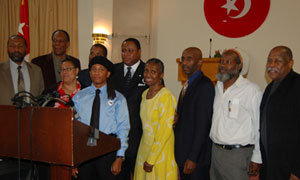NEW YORK (FinalCall.com) – The flyer announcing the April 30 forum said it would be a “Report back from the Durban II conference” by the December 12th Movement, but an added and much appreciated ingredient that evening was also the historic significance of where the forum was held.

In the 1960s, Nation of Islam Minister Malcolm X and Muhammad Mosque No. 7 were inseparable in the consciousness of the Black community in New York City when it came to the movement to bring the condition of Blacks into international consciousness, said Abdul-Hafeez Muhammad, student minister at Mosque No. 7. The Honorable Minister Louis Farrakhan, with world tours, meetings with world leaders and stirring words in international forums has far expanded the Nation’s global outreach and raised the profile of the Black struggle.
“The key is that tonight’s meeting bears witness to what the Hon. Min. Louis Farrakhan tells us repeatedly, and that is, through our unity, we can accomplish our goals,” Mr. Muhammad told The Final Call, during the forum hosted at Muhammad Mosque No. 7.
Viola Plummer, co-founder of the December 12th Movement, said being at Mosque No. 7 reflected “taking the story of our struggle to the international arena; and then reporting back to the community.” Ms. Plummer and Atty. Roger Wareham of the December 12th Movement and the International Association Against Torture, told the audience that UN anti-racism conference April 20-24 in Geneva, Switzerland, also known as “Durban II,” was a gathering to review what nations had done to fulfill commitments to fight racism since the World Conference Against Racism in 2001.
“We say that this conference was a success because in spite of all the opposition, 182 nations ‘reaffirmed’ the Durban Declaration and Programme of Action from the World Conference Against Racism 2001 that was held in Durban, South Africa,” Mr. Wareham said.
“What that word ‘reaffirm’ means is that there is a consensus of nations that said through their support for the DDPA, that Durban 2001 won’t go away–and that, brothers and sisters, is a victory for African people.”
Mr. Wareham said the program of action, signed by 189 nations in 2001, declared the trans-Atlantic slave trade was a crime against humanity and the victims of the slave trade worthy of reparations. The Western media misinformed the public on the purpose of the conference and did not report truthfully its outcome, he said.
UN High Commissioner for Human Rights Navi Pillay told reporters during a press conference at the Palais des Nations in Geneva she was happy with the conference’s success. She also talked about the challenge she faced to counter a “vast and organized disinformation campaign.”
Ms. Pillay wrote in her conference summation that the world might be a better place now that the conference approved a document that builds on the commitments made in Durban eight years ago to combat racial discrimination and intolerance worldwide.
Ms. Plummer told the Harlem audience pressure needs to be kept on the United Nations and the U.S. concerning the commitment at the world racism conference to repair damage caused by the slave trade. “We need your help in preparing for a proposed conference on the issue of reparations to be held in three weeks in St. Vincent or Jamaica,” she said. “We have engaged brothers and sisters from the Caribbean, Africa, the U.S. and Canada; and there is agreement that a conference on reparations is needed. We need those of you here tonight to help us in the planning for that conference,” Ms. Plummer said.
The Dec. 12th Movement representatives laid before the gathering an agenda for moving forward in the struggle for reparations. Its directives included:
– Demand that the UN hold the “Durban + 10” conference within the next two years for a real review of the DDPA;
– Keep up the pressure on the UN to establish a permanent UN forum dealing with issues of the descendants of African people;
– Strengthen all legal instruments in the legal battles for reparations, particularly in the Caribbean; and
– Establish a broader educational and informational network for the community on the issue of reparations and the role of the World Conference Against Racism 2001 positions in the struggle.












